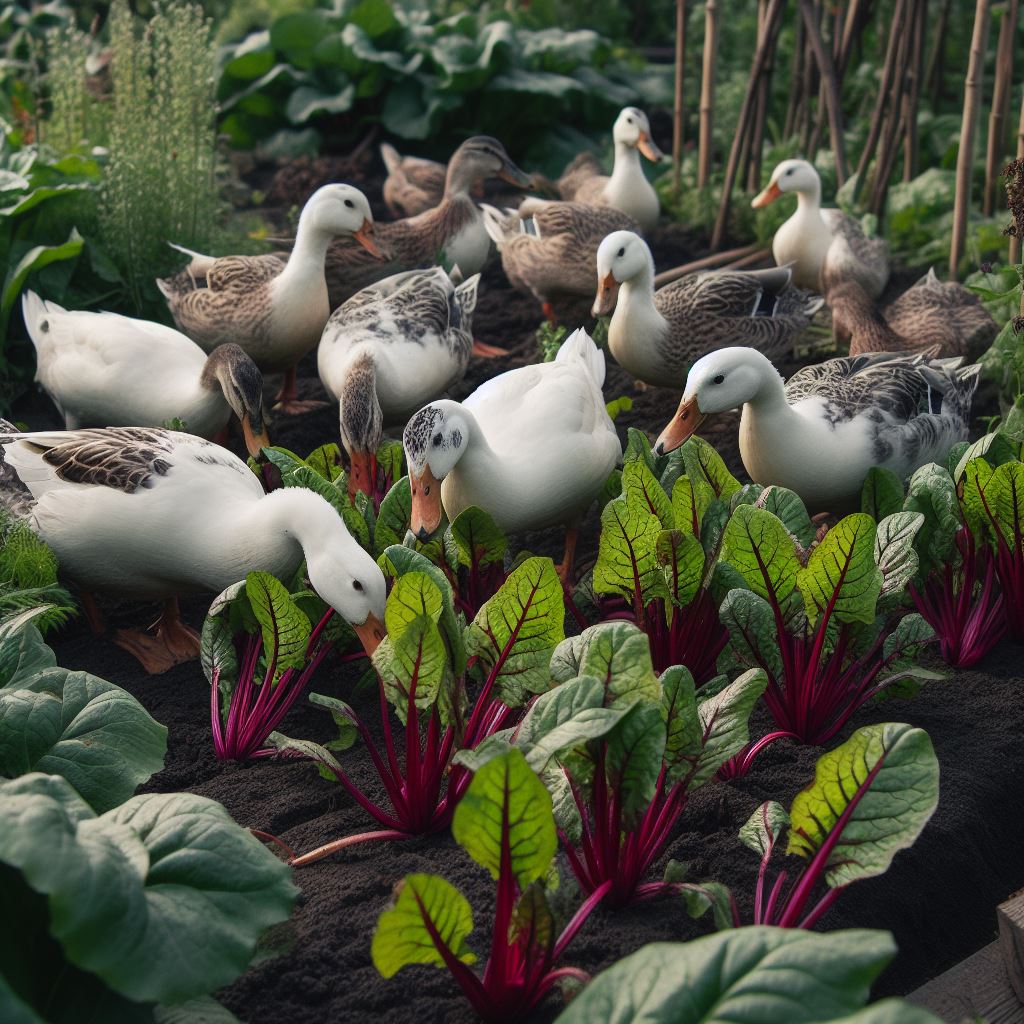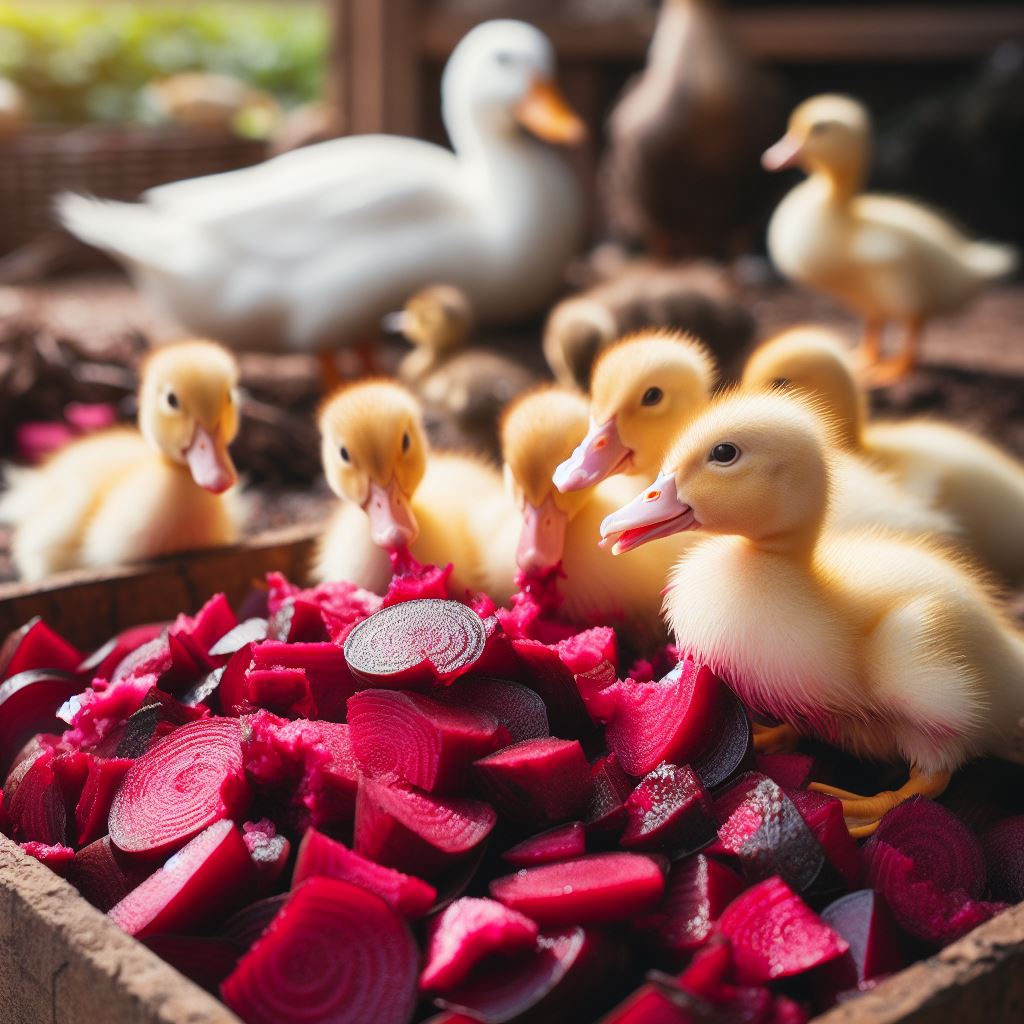Can Ducks Eat Beets? Everything You Must Know

Table of content:
- Why Ducks Can Eat Beets
- Best Ways to Feed Beets to Ducks
- Nutritional Content of Beets for Ducks
- Do Beets Have Any Risks for Ducks?
- Best Beet Supplements for Ducks
- Which Ducks Can Eat Beets?
- At What Age Can Baby Ducks Eat Beets?
- Beets for Nursing Duck Mothers
- How Often Can Ducks Eat Beets?
- Beet Greens – Can Ducks Eat Them Too?
- 5 Tasty Beet Recipes for Ducks
- Conclusion: Beets Are a Safe, Healthy Treat for Ducks
Beets are nutritious root vegetables packed with vitamins, minerals, and fiber. As omnivores, ducks can eat a varied diet of plants and small animals. This leaves many duck owners wondering – can ducks eat beets?
The short answer is yes, ducks can eat beets in moderation as part of a balanced diet. Both beetroot and beetgreens offer vital nutrients for ducks. However, there are some precautions to take when feeding beets to ducks.
Beets (Beta vulgaris) are a flowering plant grown for their edible taproot and nutritious leaves. The usually deep purple roots have an earthy, sweet flavor prized in many cuisines.
Beet greens are also edible and taste similar to spinach or chard. They can be sautéed, stewed, or eaten raw in salads.
Some key nutrients found in beets include:
- Fiber – Improves digestion and gut health.
- Folate – Essential for cell growth and development.
- Vitamin C – Boosts immunity and acts as an antioxidant.
- Iron – Prevents anemia by increasing healthy red blood cells.
- Betaine – Reduces inflammation and lowers blood pressure.
The pigment that gives beets their rich magenta hue also provides disease-fighting antioxidants.
This impressive nutritional content makes beets a healthy addition to many diets, including a duck’s diet.
 Why Ducks Can Eat Beets
Why Ducks Can Eat Beets
As omnivores, ducks eat a diverse mixture of grains, insects, vegetation, seeds, and fruit. Their varied palate allows them to obtain balanced nutrition from many sources.
Beets offer ducks the following key benefits:
- Excellent source of vitamin C, fiber, folate, manganese, and potassium.
- Leafy beet greens provide vitamin K, iron, copper, and calcium.
- Contains antioxidants that remove harmful free radicals from the body.
- Natural anti-inflammatory effects from betaine.
- Taproots and leaves promote healthy digestion.
Both domesticated pet ducks and wild ducks often graze on fresh fruits and vegetables they find near ponds and streams. Beets can provide essential vitamins and minerals to supplement their diet.
Best Ways to Feed Beets to Ducks
When offering your ducks freshly harvested beets, keep the following tips in mind:
Wash Thoroughly
Always wash dirt off beetroots and leaves to remove any residual pesticides or bacteria from the garden. Scrub the veggies gently to maintain their nutrients.
Chop or Shred Beets
Cut taproots into small pieces to make them easier for ducks to chew and digest. You can also shred or puree them.
Mix with Other Foods
For balanced daily nutrition, mix a few tablespoons of chopped beets into their regular feed ration.
Offer Moderate Portions
Too many beetroots at once can potentially cause diarrhea. About 1-2 small beets per duck is sufficient.
Remove Leftovers
Don’t leave uneaten beet pieces sitting out, as they will rot quickly in warm weather. Promptly remove and discard any leftovers.
Follow these tips, and your ducks will enjoy beets as a healthy, natural treat!
Nutritional Content of Beets for Ducks
Let’s take a closer look at why beets make a nutritious, vitamin-packed snack for ducks and waterfowl.
Protein
Beets contain only moderate protein, so they cannot replace a balanced duck diet. However, the greens do offer a protein boost.
Fiber
The high fiber content helps regulate digestion and promotes good gut bacteria. Important for ducks that graze a lot.
Vitamin C
More vitamin C than oranges! This vitamin keeps your duck’s immune system strong and disease-resistant.
Folate
Essential for cell growth and development, especially in young, growing ducklings. Ensures healthy feathers too.
Iron
Vital for producing hemoglobin to supply oxygen via red blood cells. Prevents anemia.
Betaine
This nutrient lowers inflammation markers and protects against some cancers. It also minimizes fat buildup in ducks’ livers.
Manganese and Copper
These minerals boost enzyme production for healthy bones, nerves, and metabolism.
Antioxidants
Removes free radicals that damage cells. Annihilates early signs of aging and disease in ducks and waterfowl.
A moderate serving of chopped beets can do ducks a lot of good!
Do Beets Have Any Risks for Ducks?
Beets are non-toxic for ducks. However, there are some considerations about their safety:
Bacteria Exposure
Eating contaminated produce can introduce Salmonella, Listeria, or E. coli. Always wash beets thoroughly before feeding.
High Sugar Content
Too many sugary beetroots may cause diarrhea or weight gain. Feed them as an occasional treat.
Oxalates
These antinutrients interfere with calcium absorption. Mixing beets with high calcium greens balances this effect.
Beet Greens and Seeds
Some sources claim beet leaves contain high oxalates. Research shows levels are similar to other greens that ducks eat safely. Just feed beet parts in moderation.
For most ducks, following basic safety precautions will allow beets to be a very healthy addition to their menu.
Best Beet Supplements for Ducks
If you don’t have access to fresh garden produce, you can also feed your ducks these nutritious beet products:
Dried Beet Powder
Made from dehydrated beets and sold as a supplement powder. Offers a concentrated nutrition boost.
Dried Beet Chips
Dehydrated thin beet slices that retain nutrients. A tasty, crunchy treat ducks gobble up!
Pickled Beets
Well-rinsed pickled beets provide probiotic benefits. Choose low/no salt products.
Frozen Beets
Blanch and freeze excess garden beets to feed ducks later. Let thaw before serving.
Canned Beets
Opt for low-sodium, no sugar added canned beets packed in water. Rinse before feeding.
Check ingredient lists carefully on any processed beet products before sharing them with ducks. Avoid added preservatives, flavors, sugar substitutes, etc. that could be problematic.
Which Ducks Can Eat Beets?
Nearly all domestic and wild ducks can safely eat beetroots and greens. Some key examples include:
Mallard Ducks
The most widespread wild duck across North America, Europe, and Asia. They dabble and forage in shallow marshes.
Wood Ducks
Gorgeous wild waterfowl with colorful plumage. Found near swamps, rivers, and forests across much of North America.
Muscovy Ducks
A tropical perching duck species is often kept as backyard pets. They have an omnivorous diet.
Indian Runner Ducks
A domestic light breed of duck known for standing erect like penguins. Keep them on a healthy diet.
Call Ducks
Tiny domestic ducks bred as decoys with a very loud distinctive call. Care for them with proper nutrition.
Bantam Ducks
Any miniature duck breed. Their small size makes them prone to malnutrition, so a balanced diet with occasional treats like beets keeps them thriving.
Essentially, most ducks are opportunistic foragers that will eat beetroots, leaves and stems in the wild. This makes beets a great supplemental food.
At What Age Can Baby Ducks Eat Beets?
Young ducklings have sensitive digestive systems. They should focus on a starter feed diet for the first 6-8 weeks after hatching.
Once ducklings reach 1.5-2 months of age, you can gradually introduce natural treats like chopped boiled beets. Their guts need time to mature and adjust to new foods. Wait until juvenile goslings are a similar age before offering them beet pieces.
If you plan to breed ducks, feeding the adult breeding pair a beet-enhanced diet will provide vital nutrients. These will pass to the ducklings through nutrient-rich eggs and breastmilk after hatching.
Beets for Nursing Duck Mothers
Breastfeeding is demanding on mother ducks, especially if they birth and nurse large broods. Keeping mama ducks healthy ensures the best start for ducklings.
Chopped boiled beets offer nursing ducks extra:
- Calories for energy
- Iron to prevent exhaustion
- Vitamins to enrich milk quality
- Fiber to ease digestion
Support a postpartum duck’s recovery by providing freshly foraged greens like beet leaves. The bioavailable calcium and magnesium aid bone and muscle repair after strenuous egg-laying and labor.
New duck mothers need the strength to protect and nurture rapidly growing ducklings in those critical first weeks. serving occasional grated boiled beets gives them an advantage.
How Often Can Ducks Eat Beets?
Varying a duck’s diet with a wide range of plants prevents boredom and improves nutrition. Beets offer great health benefits. However, moderation is key when feeding them.
Most duck care experts recommend offering tiny pieces of boiled beetroots or greens just 2-3 times per week at most.
Monitor your duck’s droppings after each feeding and adjust portions down if stools become loose. Diarrhea stresses duck digestive tracts.
Rotating beets with other garden produce like carrots, tomatoes, peas, corn, etc allows ducks to obtain a diversity of nutrients. A varied diet is a healthy duck diet.
Beet Greens – Can Ducks Eat Them Too?
Absolutely! The leafy beet greens are loaded with calcium, magnesium, iron, vitamins A, C, K and numerous antioxidants.
Beet leaves offer more nutritional value than taproots per calorie because of their dense micronutrient content. They lack the high sugar content of the roots as well.
The one caveat is that soils contaminated by lead-based pesticides or polluted groundwater can concentrate heavy metals in beet leaves. This risk is low for beets grown in clean soil or raised beds.
Offer your ducks a harvest bounty by collecting beetroot tops to supplement their feed. The young tender leaves are best. Introduce them slowly if beet greens are new to your ducks.
5 Tasty Beet Recipes for Ducks
Here are a few ideas to spice up your ducks’ beet offerings:
1. Beet and Fruit Salad
Chopped boiled beets, apple pieces, orange sections, and chopped grapes or berries. Packs a punch of wholesome nutrition from anti-inflammatory fruits mixed with beets. The sweetness entices picky ducks to try something new.
2. Beet Leaf Pesto
Blend beet greens, walnuts, garlic, olive oil, and Parmesan cheese into a spread. Toss with quinoa or coat duck pellets/grains for added flavor and nutrition.
3. Beet Green Dumplings
Mix chopped beet leaves, carrots, peas and corn kernels into a batter. Form small dumplings and steam or boil until cooked through. Float a few in water for ducks to gobble up the nutritious morsels.
4. Beet and Squash Mash
Roast beets and winter squash like butternut or acorn until tender. Mash together with a bit of duck broth into a flavorful puree for your flock.
5. Pickled Beets
Lightly pickle chopped beet pieces in apple cider vinegar and serve as a probiotic, immune-boosting treat. The vinegar cuts beet sugar.
Get creative with beets! Combining them with other fresh fare tempts ducks to welcome beets into their diet.
Conclusion: Beets Are a Safe, Healthy Treat for Ducks
In closing, beets check all the boxes for an excellent supplemental food for ducks. Both the taproots and leafy greens deliver a bonanza of essential vitamins, minerals, and disease-preventing antioxidants like betaine and vitamin C.
Their natural anti-inflammatory effects support duck health in multiple ways. Beets benefit digestion, circulation, liver function, immunity, and more. They earn their superfood status for humans and animals alike!
Just mind proper precautions about heavy metal exposure from soils, prep methods, and portion sizes when serving beets. Most importantly, remember beets should always enhance a balanced duck diet instead of replacing key feed components.
When fed properly alongside their layer pellets, grains, and animal protein sources, most ducks can safely feast on beets two or three times a week.
So bring on the beets for a long-lived, thriving flock! Both you and your ducks get to enjoy the many perks of this nutritious, colorful root veggie.
Welcome. I’m Adreena Shanum, the proud owner of this website, and I am incredibly passionate about animals, especially poultry. I founded adreenapets.com as a labor of love, stemming from my desire to share my knowledge and experiences with poultry enthusiasts worldwide.




